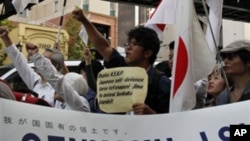Demonstrators staged competing protests in China and Japan on Saturday over disputed ownership of islands in the East China Sea.
The larger protests occurred in three Chinese cities - Xian, Chengdu and Zhengzhou - where several thousand demonstrators asserted Chinese sovereignty over the islands and called for boycotts of Japanese products. News agencies said the protests were mostly peaceful, although Japan's Kyodo news agency quoted two Japanese retailers in Chengdu as saying Chinese demonstrators broke windows and showcases in their stores.
In Tokyo, about 3,000 demonstrators protested what they called China's "invasion" of the islands. China's state-run Xinhua news agency said the Chinese government expressed its "deep concern" about the Tokyo protest by what it called "Japanese right-wing persons."
The disputed islands lie between Japan's Okinawa island and Taiwan. China refers to the archipelago as the Diaoyu Islands, while Japan calls them the Senkaku Islands. The waters around the islands are a rich fishing territory and are believed to hold undersea natural gas and oil reserves.
The two Asian economic powers have lately had a contentious relationship. In early September, a dispute grew after a Chinese fishing trawler collided with two Japanese patrol boats. Japan detained the Chinese trawler captain for 17 days before releasing him.
Leaders of the two countries subsequently patched up differences over the incident. But for some Chinese and Japanese nationals, underlying resentment runs strong.
Some Chinese still resent Japan for its World War II invasion and occupation of parts of their country. Some in Japan are dismayed at China's emergence as a world economic power that has surpassed Japanese financial clout.
Some information for this report was provided by AP and AFP.










